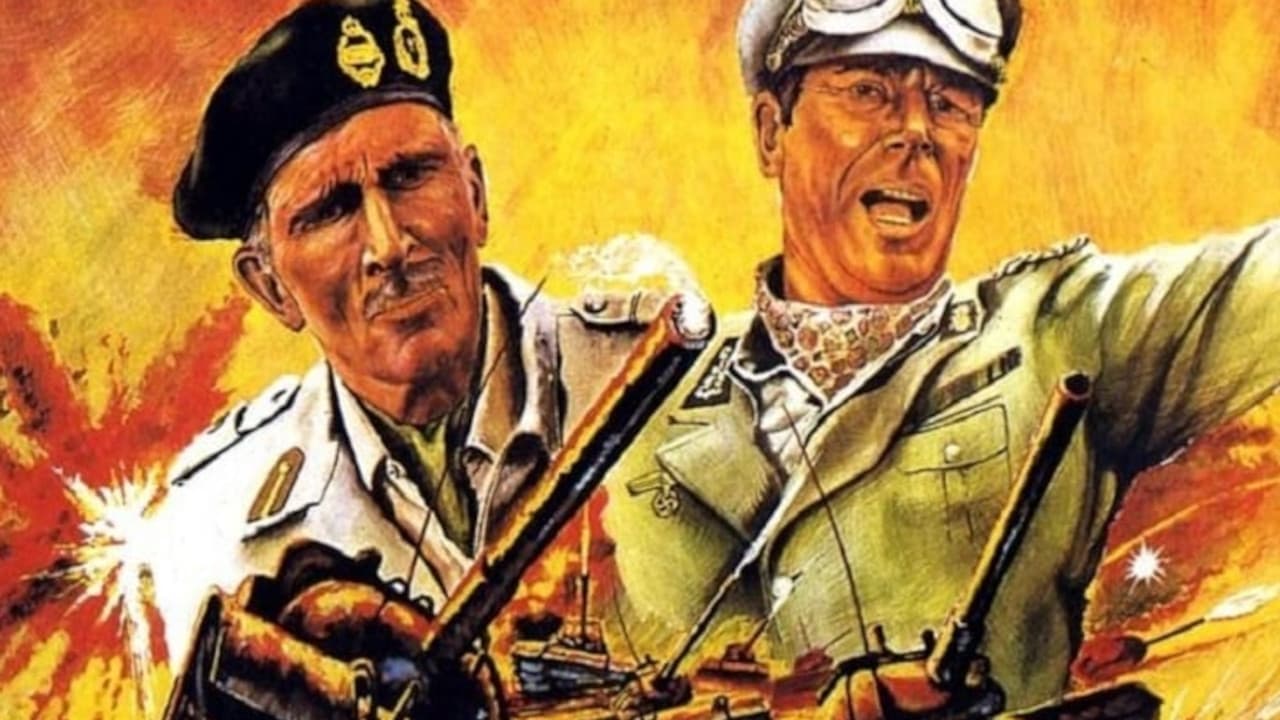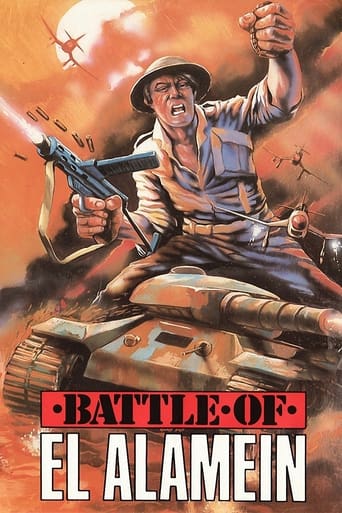Interesteg
What makes it different from others?
NekoHomey
Purely Joyful Movie!
Ezmae Chang
This is a small, humorous movie in some ways, but it has a huge heart. What a nice experience.
Jemima
It's a movie as timely as it is provocative and amazingly, for much of its running time, it is weirdly funny.
MARIO GAUCI
This isn't a bad WWII adventure, in fact a fair imitation of the big-budget Hollywood films from that vintage; the international cast is second-rate but both Michael Rennie and Robert Hossein cut a serviceable figure as General Montgomery and Field Marshall Rommel respectively - and there's a good performance by Enrico Mario Salerno as an Italian officer of the Bersaglieri.The film deals with Rommel's famous North African campaign, in which the Nazis were 'aided' by the Italian forces (more precisely, the latter served as a shield to the former, with their largely disheveled armies being deemed disposable). Interestingly, but unsurprisingly, the Fascists are the heroes here (though Frederick Stafford is portrayed as a martinet) while the Allies, i.e. the British, are the villains (at one point, they're even shown massacring a group of unarmed Germans in cold blood) - but, at least, there's one sympathetic member in George Hilton; the Germans stand somewhere in the middle: Rommel is treated as a level-headed strategist who, however, is extremely critical of the Fuehrer's unrealistic orders (and, even if the film is clearly set in 1942, is already seen to be a willing participant in what eventually became the July 1944 plot to assassinate Hitler). The cast also includes Gerard Herter (who, memorably, had been the aristocratic sharpshooter and Lee Van Cleef's alter-ego in THE BIG GUNDOWN [1966]) as a German officer who doesn't see eye to eye with Rommel.The action is frequent and well-handled, and there's even a healthy dose of comedy - at least among the Italian lines (which may well have been lost in the English translation!); besides, Carlo Rustichelli's upbeat score is a major asset...and surprisingly - but satisfactorily - the film provides a downbeat ending! I'll be following this with two other Italian war films - Enzo G. Castellari's EAGLES OVER London (1969), also with Stafford, and Sergio Martino's CASABLANCA EXPRESS (1989)...
Ralph
OK I know, it's a cheesy flick with a low budget, but I really enjoyed it. The Italian tanks coming into the battle was awesome! I always play this game called Panzer General and my favorite moves are trying to amass Italian troops against the Allies just to test my ability. I'm glad the Italians were run by very VERY incompetent Officers because they could have been a real asset (more so) to the Germans. This is the story of an elite Italian Infantry unit (the Bersaglieri). In all, six of the 12 total Bersaglieri regiments fought in North Africa, compiling an excellent combat record. More than once, Bersaglieri units fought to the last man to hold a position while German units ran away. This movie tells of one of those engagements, and the first time I saw it and what armament they had to face a dozen tanks, I was really entertained and so will you! Try to get a decent print though because I was so desperate to see this one time that I bought it on tape and it was horrible, the DVD was really bad but at least it was watchable. It's the only one of it's kind that I've seen although I loved movies like Stalingrad (the BW version) that showed some of the Romanian army's in action. Interesting for war film buffs and recommended.
leagueofstruggle
Usually Italian films of the 60's, 70's, and 80's are considered sub par products primarily made for export to foreign markets. In many cases the WWII film followed the same formula. Take the plot of The Dirty Dozen, recycle it, add a trampoline and you have an entirely new and exportable film! (Yes, this is a dig at Cinque per l'inferno aka Five for Hell)La Battaglia di El Alamein struck me as different in that it focuses on the Italian army rather than German or American as usual for Italian war cinema of the time. The movie shows the Italian forces in a patriotic light. Some may balk at this portrayal as the Italian forces are generally characterized historically as inefficient units dogged by low morale. The movie has a generality of historical accuracy, embellished for cinematic reasons. The British are characterized as cold unfeeling soldiers, no worse than American directors portray Axis forces, though. Perhaps Battle of El Alamein portrays the Italian as a little too brave and heroic but this is the same heavy-handed treatment heroes in American films were given up until recently. The film stands out as an Italian production made for Italy's own populace. In this light any shortcomings can be overlooked. Yes, even miniature remote controlled model tanks that rumble across the desert can be overlooked. An Italian production heads and shoulders above many b-grade counterparts of this time period.
SgtSlaughter
"The Battle of El Alamein" is to the Italian film industry what "The Longest Day" was to Hollywood – a historically accurate portrayal of a real military action. This Italian-French co-production was filmed with the full cooperation of the Italian Army, and features a star-studded international cast.Director Giorgio Ferroni spends some time focusing on the officers running the battle to outline the big picture and lend historical credence to his focus, a fictional story of a front-line Italian infantry company which becomes entangled in the campaign. When his Captain (Ettore Manni, "Heroes in Hell") is killed, Lt. Giorgio Borri (Frederick Stafford, "Eagles over London") is forced to take over command of his company. Borri is an inexperienced young officer with a lust for adventure, even if it means putting his men in harm's way. Stafford is never less than totally convincing, the contempt his men feel for him can be shared by the audience. He's a true jerk who learns the hard way what war is all about. Enrico Maria Salerno is his brother, a veteran Sergeant-Major, who shows up unexpectedly and question's the Lieutenant's decisions every step of the way. Rounding out the platoon are several familiar Italian actors, including Sal Borgese, Ricardo Pizzuti, Massimo Righi and Nello Pazzafini.To add credibility to his story, Ferroni also spends a great deal of time focusing on the situations within both the British and German High Commands. Michael Rennie ("The Devil's Brigade") plays Field Marshal Montgomery with gusto and arrogance, just as well and as memorably as Michael Bates would in "Patton" less than two years later. Also on the British side is the humanitarian Lt. Graham Lt. Graham (George Hilton, "The Liberators"), who protests the massacre of innocent German prisoners in one moving, dramatic scene and winds up volunteering for a suicide mission. He also has a face-to-face encounter with Lt. Borri, which breaks down the barrier between opposing sides in wartime. The men on the front lines are just grunts, there to do their job – the officers, even those on your own side, don't care about you and your welfare; you're just another rifleman. Finally, Ferroni focuses on the German situation and these may be the finest scenes in the film. Most of the scenes take place in an underground command bunker, a set which has never been so well-captured and looked more realistic. Field Marshal Rommel is played brilliantly by Robert Hossein ("Desert Assault"), who makes Rommel a true skeptic of Hitler with his stern and loud opinions. Rommel was a true soldier, fighting to get the job done, and Hossein's performance is on-target. The supporting German characters are all excellent, too: Gerard Herter ("Battle of the Commandos") is especially good as a dedicated Nazi General; Tom Felleghy ("Kill Rommel!") plays Gen. von Thoma, a skeptic of just about everything, loyal only to Rommel; and Giuseppe Addobbati ("Hell's Brigade") is an incompetent General, who makes a poor tactical error, resulting the destruction of half of the Afrika Korps. The action sequences are all the more believable and gripping because of the characters embroiled in them. The film's opening is a sequence depicting the ambush of an Italian artillery company, in which Ferroni makes the most of his camera. This sequence is filled with pans, zooms and quick cutting. Machine-gun fire kicks up puffs of dirt everywhere and several soldiers die. The later battle scenes are shot with the same dedication to detail, and for the third act Ferroni brings in dozens of tanks and lots of big explosions. There is one really bad-looking night scene involving some miniature tanks, but that can be virtually ignored because everything else outweighs it. Despite the epic proportions of the action, the well-established characters give them a deeply personal significance. From the start of the film, Ferroni establishes a mood and feel of intensity and hopelessness. None of the characters are clean-shaven; they are all sweltering in the intense desert sun. One scene in which Lt. Borri must trek through the desert alone without water was especially well-acted. This film takes the story of the heroic grunts in the field and makes us feel for them – feel their thirst, feel their joy when supplies arrive, feel their longing for home when one soldier fondles a picture of his newborn son at home. Carlo Rustichelli's mournful score only adds to the proceedings.Tie a great cast, epic battle sequences and fine editing and flavor and one has a strong, entertaining war film. This ranks with the classics. Not be missed!

